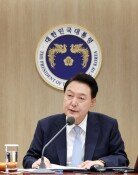[Editorial] Anti-US Beef Protests: One Year Later
[Editorial] Anti-US Beef Protests: One Year Later
Posted April. 29, 2009 03:07,
A year ago today, the MBC investigative program PD Notebook called a downer cow a mad cow in an episode titled, Breaking Coverage Are U.S. Beef Imports Really Safe from Mad Cow Disease? The program said Koreans are 94 percent more likely to contract a human form of mad cow disease amid scary background music. The next day, posts on the program flooded Internet sites related to mad cow disease and the Web portal site Daum. Girls and people scared by the programs unfounded claims and from online posts flocked to Seouls downtown Cheonggye Plaza to hold candlelight vigils.
Some 1,000 anti-American and pro-North Korea groups formed the People`s Association for Measures against Mad Cow Disease. Led by the Korean Confederation of Trade Unions, the Korean Teachers and Educational Workers Union, the Peoples Solidarity for Participatory Democracy, the Korean Federation for Environmental Movement, and the Federation to Implement the Inter-Korean Summit, a group ruled as illegal, led the oftentimes violent protests for about 100 days and demanded the resignation of the Lee Myung-bak administration.
This shows that if a group takes advantage of media, a common asset of the people, a nation can slip into chaos and its very foundation can be shaken. MBC reluctantly aired an apology under orders from the Korea Communications Commission, but seems unremorseful over what it did. On the probe into PD Notebooks mad cow disease episode, the network said in a statement, This was a program that criticized government policy in the interest of the publics right to health. The criminal investigation is unprecedented oppression of the media in a civilized nation of the 21st century and the killing of democracy.
U.S. beef imports were resumed in June last year and are second only to those from Australia in the country. Forty-eight million Koreans, 300 million Americans, one million Korean Americans, and people in 89 countries eat American beef with no problems. Korea suffered direct and indirect losses of 3.7 trillion won (2.7 billion dollars) due to the protests trigged by MBCs falsehood and fanaticism, according to Korea Economic Research Institute.
The Lee administration was plagued by social instability and delayed reform of the public sector early in its term, and the global financial crisis has hit the country. Law enforcement authorities were overwhelmed by illegal protests and a lawless condition was left unattended for almost three months in Seoul. Malicious Internet users blackmailed companies advertising in newspapers that criticized the protests, including The Dong-A Ilbo, threatening free speech and the market economy.
Certain people who joined the candlelight protests were truly worried about public health and were disappointed by the governments poor negotiations over U.S. beef. The instigators, however, disguised themselves as protesters holding candles to protect public health and took advantage of innocent citizens.
Dr. Ahn Se-yeong, a professor at the Graduate School of International Studies at Sogang University in Seoul, told a panel discussion on the protests last week, We cannot make the same mistake again only when we find the truth. Serious discussion and reflection on what happened a year ago are needed to prevent lying broadcasters and certain groups from instigating the public and fueling chaos.
Headline News
- Israel prepares for retaliation against Iran
- Samsung reclaims top spot, surpassing Apple in smartphone market
- 77% of Koreans in 20s and 30s are 'Kangaroo Tribe' due to job crisis
- KBO referees embroiled in controversy over ABS decision concealment
- Inflation, oil price surge put double shock on global economy







